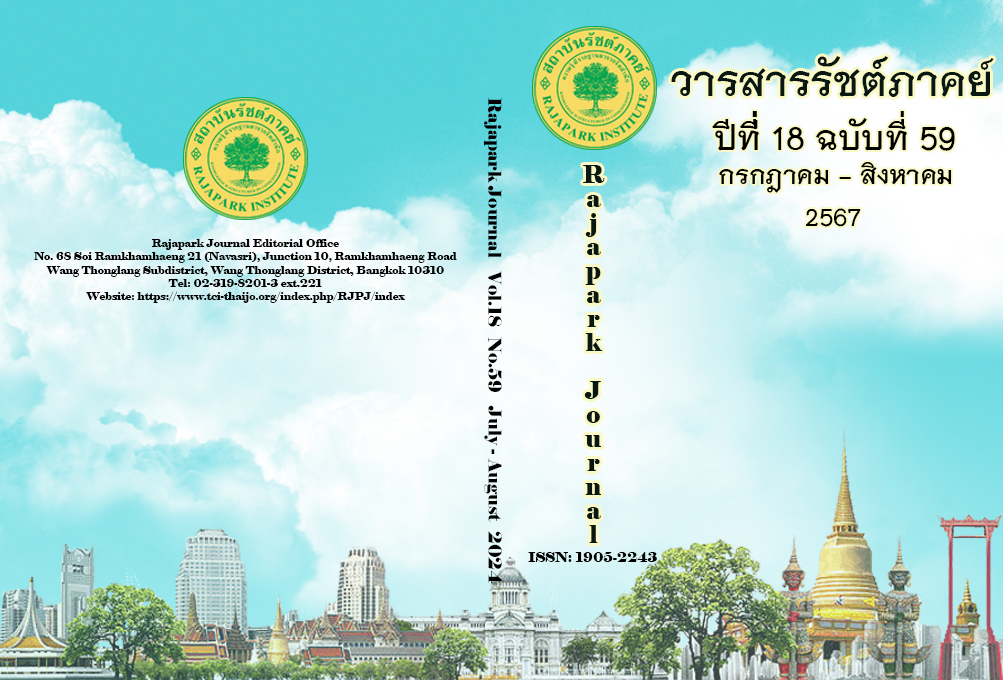Components of Digital Technology Competency of Educational Institution Administrators in the Secondary Education Service Area of Bangkok, Area 2
Main Article Content
Abstract
The purpose of this research was to study the components of digital technology competency of educational institution administrators in the Secondary Educational Service Area Office Bangkok 2. A survey research method was conducted. The data were collected from the entire population of 52 schools, which consisted of 212 administrators. The qualifications are determined according to the inclusion criteria. The data collection instrument was a five-point rating scale questionnaire with a Cronbach's alpha coefficient of 0.972. The data were analyzed by descriptive statistics and exploratory factor analysis (EFA). The research results found that the components of digital competency of educational institution administrators in the Secondary Educational Service Area Office Bangkok 2 consisted of 7 components: 1) digital literacy; 2) digital transformation; 3) digital technology; 4) digital governance; standards and compliance 5) digital leadership; 6) strategic and project management; and 7) digital process and service design. Each of the components consisted of 5 indicators that were consistent with the empirical data: index CMIN/df, p-value, NFI, CFI, IFI, GFI, AGFI, RMESA, and RMR according to the specified criteria. The factor loading of each component ranged from .331 to .898, and the factor loading of each indicator ranged from .314 to .912.
Article Details

This work is licensed under a Creative Commons Attribution-NonCommercial-NoDerivatives 4.0 International License.
Views and opinions appearing in the Journal it is the responsibility of the author of the article, and does not constitute the view and responsibility of the editorial team.
References
Bellanca, J., & Brandt, R. (Editors). (2011). 21st Century Skills: Rethinking How Students Learn.
Wongkitrungruang, W., & Chittarerk, A. (Translators). Openworlds.
Boontham, T. (2016). Leadership in the digital economy era and sustainable development of educational organizations. Journal of King Mongkut's University of Technology North Bangkok Industrial Education, 7(1), 220-221. http://journal.fte.kmutnb.ac.th/download/v7n1/journalFTE-Fulltext-2016-7-1-25.pdf
Buehler, D. (2016). Digital Leadership & Strategy & Online. http://www.slideshare.net/how-to-kick-assonline-part-1-digital-leadership-strategy-doyle-buehlerdigital-leadership
Chindanurak, T. (2017). Teachers and students in the Thai education era 4.0. Journal of Sukhothai Thammathirat University, 7(2), 14-29. https://www.stou.ac.th/website/ejodil0.5 /filejodil/16_2_603.pdf
Damrongpanich, S. (2020). Writing MPLUS and analyzing school research data Science and Social Sciences (11th ed.). Chulalongkorn University.
Kaiyawan, Y. (2014). Multivariate statistical analysis for research (2nd ed.). Chulalongkorn University.
Keesukphan, E. (2016). School management in digital era. http://www.trueplookpanya.com
Klanpaitoon, S., & Wannasri, J. (2021). A Model for Developing Instructional Leadership in the Digital Age of Basic School Administrators. Journal of MCU Peace Studies, 11(2), 478-482. https://so03.tci-thaijo.org/index.php/journal-peace/article/view/255069
Leesakul, P. (2018). Leadership in Digital Era. https://today.line.me/th/pc/article/Leadership+in+digital+era
Office of the Civil Service Commission. (2017). Digital skills of civil servants and government personnel to transform into digital government. https://www.ocsc.go.th/
Office of the Digital Economy and Society Commission National Society. (2019). Competency framework digital for Thai citizens. Office of the Digital Economy and Society Commission National Society.
Office of the Secretariat of the Education Council. (2019). State of Thai education 2018/2019 educational reform in the digital age. Office of the Secretariat of the Education Council.
Phanphumphruek, M., & Wannasri, J. (2017). A study of administrative skills of the school administrators under Kamphaengphet primary educational service area office 2. Journal of Education and Innovation, 21(1), 172-182. https://so06.tci-thaijo.org/index.php
/edujournal_nu/article/view/84154
Praphanphat, J. (2017). A study of innovative leadership of school administrators in the opinions of the teachers under the supervision of Pathumthani primary educational service area office[Master's thesis, Rajamangala University of Technology Thanyaburi].
http://www.repository.rmutt.ac.th/dspace/handle/123456789/3353
Spencer, L.M., & Spencer, S.M. (1993). Competence at Work: Models for superior performance. John Wiley & Sons.
Sirisak, K. (2016). Curriculum research on teacher education program for developing digital competence enhancement guidance [Master’s Thesis, Chulalongkorn University]. http://doi.org/10.58837/CHULA.THE.2016.857
Sungpho, J., Chanthiwasarakit, S., & Udeeram, S. (2017). Leadership in management in the digital age: IT and IT-related organizations in Bangkok and its vicinity. College of Innovation Thammasat University.
UNESCO. (2016). A Policy Review: Building digital citizenship in Asia-Pacific through safe, effective and responsible use of ICT. UNESCO.


